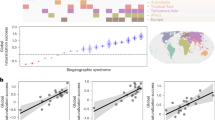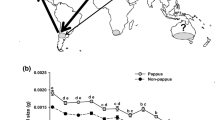Abstract
A large fraction of the immigrant (or founder) populations of terrestrial plants are small (< 104) and are acutely sensitive to environmental stochasticity. As a result, they undergo radical size fluctuations during a prolonged lag phase that almost always result in their extirpation. Naturalizations are those rare examples in which an immigrant population increases above a threshold size such that the consequences of environmental stochasticity are markedly lower. The likelihood that a non-indigenous population will reach this threshold size would be enhanced substantially through either deliberate or inadvertent cultivation. Cultivation (e.g. protection from predators, parasites, drought, frost) shields small immigrant populations from the extreme expressions of environmental stochasticity. In addition, cultivation can preserve through seed storage a residual non-indigenous population from which new populations can be established. As disseminules are spread locally, and even regionally, immigrant populations sample a wide variety of micro-habitats, thus increasing the likelihood that some plants will survive even without cultivation. Origins of naturalized floras in Australia and the US reveal a strong circumstantial link between cultivation and subsequent naturalization: the single largest group of naturalized species was deliberately introduced as either crops, forage spp., or ornamentals. Another group was introduced inadvertently as contaminants in crop seeds. This correspondence between cultivation and subsequent naturalization provides a common demographic explanation for non-indigenous plant persistence that largely transcends species’ attributes and the commonly ascribed features of communities that are vulnerable to the entry of non-indigenous plants. Humans have played a more profound role in fostering plant naturalizations than by acting simply as plant dispersers; their post-immigration cultivation fosters much naturalization.
Similar content being viewed by others
Author information
Authors and Affiliations
Rights and permissions
About this article
Cite this article
Mack, R.N. Cultivation Fosters Plant Naturalization by Reducing Environmental Stochasticity. Biological Invasions 2, 111–122 (2000). https://doi.org/10.1023/A:1010088422771
Issue Date:
DOI: https://doi.org/10.1023/A:1010088422771




